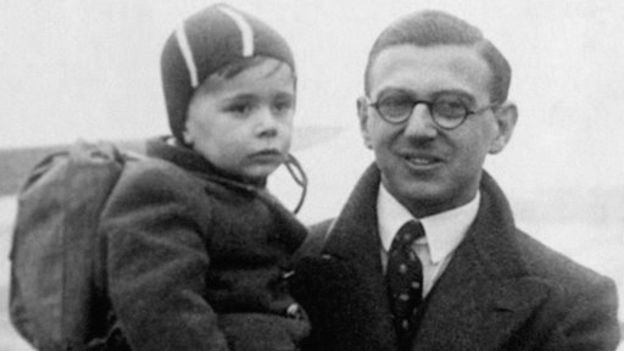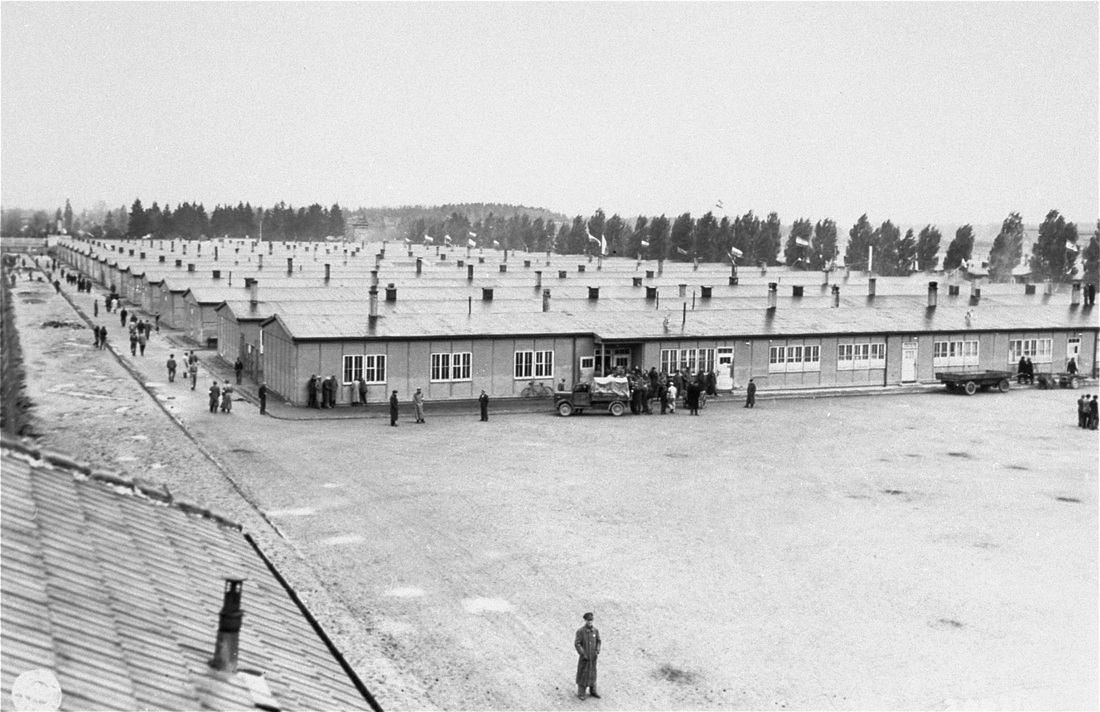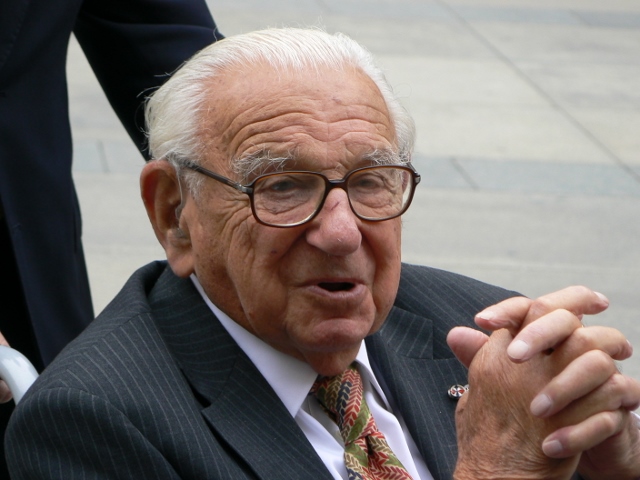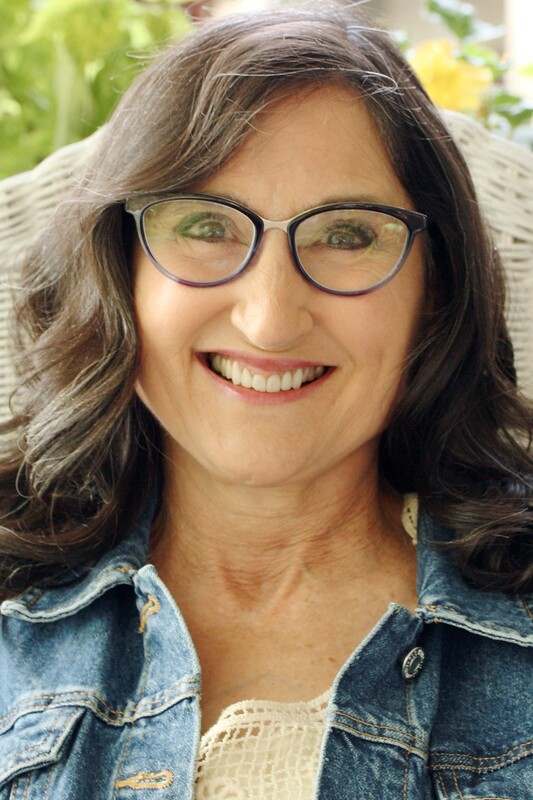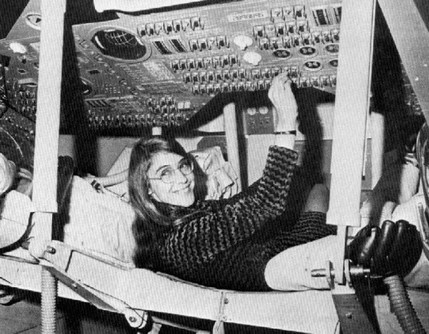 Neil Armstrong's small step and humankind's large one was brought to you by....ta-dah! A woman. Yep. Her name was Margaret Hamilton, and without her brains (yes, blonds are smart) the lunar landing might have been aborted. This past week, forty-four years ago, alarm bells went off on Apollo 11's on-board computers shortly before the scheduled lunar landing. Well, back in 1969, when women got coffee for the boss, thank God, they also wrote code. 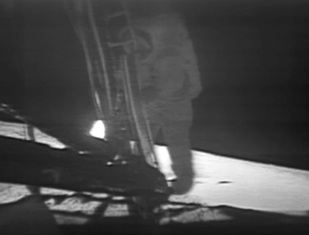 Apollo 11 first step - NASA Apollo 11 first step - NASA Margaret not only headed the MIT team that programmed Apollo 11's computers, she made certain the software was rigorously tested. “I remember thinking, Oh my God, it worked,” the pioneering software engineer told TIME for a copyrighted article out this week. “I was so happy. But I was more happy about it working than about the fact that we landed.” Prior to Armstrong's step on the moon, the computer was processing superfluous information leaving too little room on to run the landing software. But the testing Margaret had done prior to blast off, paid off. The computer had been programmed to solve the problem itself. 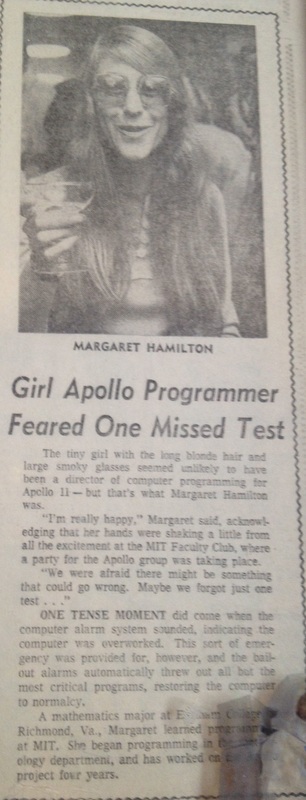 “It got rid of the lesser priority jobs and kept the higher priority jobs, which included the landing functions,” Margaret told TIME. Margaret received little attention for her work in 1969, but NASA did award her the Exceptional Space Act Award. Some of the news coverage she did receive highlights the male chauvinism of the times. One reporter called the 31-year-old woman a "tiny girl with long blond hair." See more here... Thanks to Jessie Stickgold-Sarah for the photo and bringing this issue to the forefront on her blog. Great post here from the Columbia Journalism Review on the gender gap in the sciences. Is the news media helping or hindering? Compare the 1969 headline with the one below from July 20, 2015. Margaret Hamilton continues her work in computer engineering today, and thing may have improved in general for women since 1969, but in the sciences there are still far fewer women than men in research jobs, and those women earn substantially less than their male counterparts. You can see this 2015 article by Dylan Matthews here...
Margaret first used a term we all take for granted today. "I began to use the term 'software engineering' to distinguish it from hardware and other kinds of engineering," Hamilton told Verne's Jaime Rubio Hancock in an interview. "When I first started using this phrase, it was considered to be quite amusing. It was an ongoing joke for a long time. They liked to kid me about my radical ideas. Software eventually and necessarily gained the same respect as any other discipline." Code was originally considered women's work because it required a lot of typing like a clerical job. Boys are writing much more code today, than girls. Check out this movement Girls Who Code and make sure the girls in your life know about it. 
Any American school child can tell you freedom is essentially the right to do what you want. Born in America and you're born with the right to life, liberty and the pursuit of happiness.
Despite our Bill of Rights, growing list of amendments and civil protections, how many moments of the day do we find ourselves wanting something more, or something different? Not able to capture the happiness we pursue?
We experience true freedom when our fears and desires fall away, allowing us a clear view. True freedom allows us to open our hearts without counting the cost.
Clear sight plus compassion equals freedom, the freedom to act with courage upon what really matters. Nicholas Winton was a man who put skin on those somewhat nebulous and high-minded ideals. was a successful stockbroker living the good life. Like many others around the world, in 1938 he read in the newspaper about Nazis persecution of Jews. After the Munich agreement, when the Nazi’s marched into Czechoslovakia, Nicholas read about the thousands of families fleeing to Prague in hopes of escaping.
He took a two week vacation from his job and home in London and went to Prague to see if he could help.
The children were especially vulnerable. “I went out into the camps where the people had been put who had been displaced and it was winter and it was cold.” Nicholas Winton rented a hotel room and started figuring out a way to get the children out.
Winton tried to get the Americans to take some of the children, but our doors were closed. An embassy letter told him, “…United States Government is unable…” to help. Finally, the British said the kids could come to England if families would agree to take them in. While the travel documents stalled in government bureaucracy... prisoners at Dachau were forced to build a large complex of buildings to upgrade the concentration camp in preparation for large numbers of prisoners. Nicholas Winton's small volunteer organization started to forge documents, bribe and blackmail. His motto: “If something’s not impossible, there must be a way of doing it.” A train carried away the first 20 children the day before Nazi’s marched into Prague and Adolf Hilter stood in an open vehicle touring the city and waving to the crowds. Nicholas kept at it. Over six-hundred children on seven trains journeyed across Nazi Germany to Holland, where they caught a ferry to England. Nicholas had an eighth train loaded with 250 children and scheduled to leave September 8th when the war in Europe started. About 88,000 Czech Jews were deported to Auschwitz and other extermination camps. In 1945, some 15,000 children were found living in the children's home inside Auschwitz, only 93 of those children survived.
Sir Nicholas Winton, died this past week at age 106. He kept silent for 50-years about how he saved hundreds of children from Nazi genocide.
Hindsight, it's tempting to think we might have seen clearly what the Nazis were doing. We might have had the compassion to try and help. We might have been free from our fears, our plans, our wants, free enough to widen the net of our responsibilities and act with moral courage.
But listen to this. Nicholas explained he never talked much about what he did in 1938 because "...there's too much emphasis on the past...nobody is concentrating on the present and the future." To fully concentrate on the present and the future, we must find our way to freedom, true freedom. Add your two cents below... |
I'm fascinated to discover little-known history, stories of people and events that provide a new perspective on why and how things happened, new voices that haven't been heard, insight into how the past brought us here today, and how it might guide us to a better future.
I also post here about my books and feature other authors and their books on compelling and important historical topics. Occasionally, I share what makes me happy, pictures of my garden, recipes I've made, events I've attended, people I've met. I'm always happy to hear from readers in the blog comments, by email or social media. Archives
September 2023
Categories
All
|

